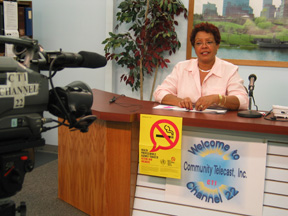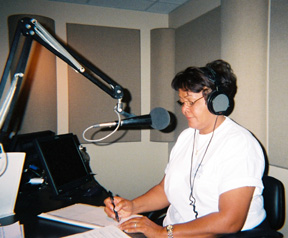 |
Antonia Correa taping “La Voz Latina.” |
It’s a mission she’s been fighting for several years as the tobacco prevention specialist for the UNMC Community Partnership.
During the past eight months she has established herself as a leading voice and face against tobacco use by Latinos through a series of live, call-in appearances on Spanish-language radio and television shows.
Thanks to a Tobacco Free Nebraska grant obtained by Community Partnership in November 2004, Correa began hosting 15 weekly one-hour Spanish talk shows on Radio Lobo (KBBX 97.7 FM) to educate Spanish-speaking listeners on the benefits of clean indoor air. Her live, call-in presentations aired on Saturday morning and gave Correa an opportunity to answer a wide variety of questions relating to tobacco use, not just focusing on clean indoor air. Radio Lobo provided 240 promotional spots to advertise the show during the 15 weeks it aired. Negotiations are under way to get Correa back on the air due to listener requests.
In December 2004, Correa took her message to television in a series of 15 monthly appearances on the one-hour Spanish talk show “La Voz Latina” on Cox Cable 22. Again, her primary focus is educating Spanish-speaking people on the benefits of clean indoor air. She is the co-host on “La Voz Latina,” which is scheduled to air on the third Tuesday of every month through June 2006.
The Metro Omaha Tobacco Action Coalition — of which Correa is a member — has worked to increase knowledge about the harmful efforts of secondhand smoke and the clean indoor air policy. The coalition believes that more minorities must become stakeholders in solving the problems of secondhand smoke if the battle is to succeed on a broad scale.
U.S. Surgeon General Richard H. Carmona, M.D., has stressed the importance of preventing children from being exposed to second-hand smoke and from becoming tobacco users themselves. More than 400,000 American die every year from smoking-related illnesses – the leading cause of preventable death in the United States.
 |
Antonia Correa “live” on Radio Lobo. |
“And because their lungs are not fully developed, young children exposed to smoke are at an increased risk for sudden infant death syndrome, asthma and other problems. Second-hand smoke increased the number of and severity of asthma attacks in asthmatic children, further adding to their discomfort and limiting their school and physical activities.”
Dr. Carmona outlines 10 tips against second-hand smoke and tobacco usage. MOTAC has a similar list of anti-tobacco activities and resources that local Spanish-speaking people can access immediately. Correa suggests people:
- Quit smoking. Talk to your doctor about it. More than half of all adult smokers in America have quit. There are many free or low-cost programs that can help you quit. Contact 402-280-5287 for local classes, groups and individual counseling sessions to help quit.
- Keep your home and motor vehicle smoke-free. Ask your family and friends to smoke outside of the home. Between 50 and 67 percent of children under age 5 live in homes with at least one adult smoker. Don’t smoke while holding a child or when near a child. Don’t allow caregivers to smoke around your child, including babysitters, grandparents and neighbors.
- Don’t smoke if you’re pregnant. Smoking during pregnancy can lead to a low-birth weight baby (a leading cause of infant death) and can reduce your baby’s lung function.
- Patronize smoke-free businesses and promote smoke-free environments. Join the Smoke-Free Omaha movement. Visit www.smokefreeomaha.org.
- Keep all tobacco products out of the reach of kids. Talk to your child about the dangers of tobacco. Kids need constant reinforcement of positive health messages. Ask if any of your child’s friends smoke. If they do, teach your kids how to encourage their friends to seek help to quit smoking.
“I have had people call in during my radio show and tell me that they have quit smoking since listening to my program,” Correa said. “Tobacco use is a global problem – in fact much worse outside of America where the resources against tobacco use are not as developed. Tobacco kills nearly 5 million people a year around the world and that number will rise to 10 million a year by 2020. Many of these deaths will be in the developing world, especially the Spanish-speaking world where the majority of local Latinos either came from as immigrants or still have extended family living.
“Although this battle must be fought one person at a time, one family at a time, it is really about saving the lives of Latino people everywhere. The economies of many Spanish-speaking nations are uplifted by the billions of dollars sent home by Latinos in America. Now we want them to also send the message home to their loved ones that second-hand smoke is a killer and tobacco use is completely preventable with education and guidance.”